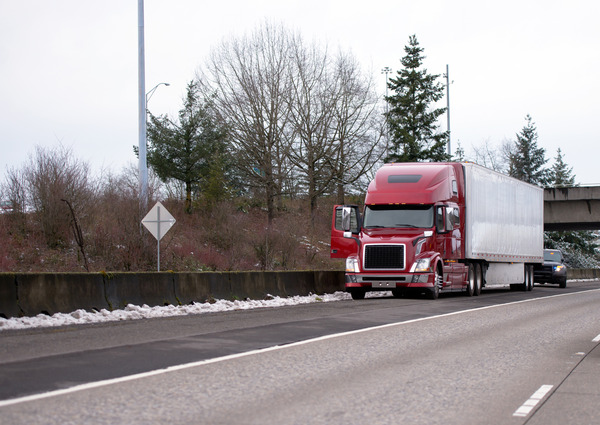How Illinois trucking regulations can impact your accident claim: What Chicago drivers need to know
Truck Accident - March 7, 2025 by Horwitz, Horwitz & Associates
At Horwitz, Horwitz & Associates, we understand how complex trucking accident cases can be, and we are committed to helping Chicago residents navigate the legal process. This blog will explore how trucking regulations impact accident claims in Illinois and what you need to know if you or a loved one has been involved in a truck accident. Keep reading for more, then call one of our skilled Chicago truck accident lawyers at (800) 985-1819.

Key trucking regulations that affect accident claims
Trucking regulations are designed to promote safety on the road, prevent accidents, and hold drivers and trucking companies accountable. When these regulations are violated, they can directly impact accident claims by establishing liability or contributing to the severity of an accident. Below are some of the most important regulations that come into play in Illinois trucking accident claims.
Hours of service regulations
One of the most critical federal regulations is the Hours of Service (HOS) rules established by the Federal Motor Carrier Safety Administration (FMCSA). These rules limit the number of hours a truck driver can be on the road without taking mandatory rest breaks. The goal is to reduce driver fatigue, a major cause of trucking accidents.
- Drivers can drive a maximum of 11 hours after 10 consecutive hours off duty.
- Drivers may not drive beyond the 14th consecutive hour after coming on duty, following 10 hours off duty.
- Drivers must take a 30-minute break after driving for 8 cumulative hours.
Violations of HOS regulations, such as falsifying logbooks or driving beyond the allowed hours, can make a trucking company or driver liable for an accident. In an accident claim, proving that a driver violated HOS rules can significantly strengthen your case.
Truck maintenance and inspection requirements
Trucking companies are required by law to maintain their vehicles in safe working condition. This includes performing regular inspections, maintenance, and repairs. The FMCSA and Illinois state laws, such as the Illinois Vehicle Code, mandate that trucking companies keep detailed records of all inspections and repairs.
If a truck accident is caused by faulty equipment—such as brake failure, tire blowouts, or steering issues—a thorough investigation may reveal that the trucking company failed to properly maintain the vehicle. In such cases, the trucking company could be held liable for the accident.
Weight limits and cargo securement
Overloaded trucks and improperly secured cargo are common causes of trucking accidents. Trucks have strict weight limits to prevent rollovers, jackknifing, or loss of control. The FMCSA regulates the maximum weight a commercial truck can carry, and Illinois enforces weight limits for vehicles operating within the state.
In addition to weight limits, the FMCSA requires that cargo be properly secured to prevent shifting during transport. Failure to comply with these regulations can result in accidents, especially on busy highways in and around Chicago. If an investigation shows that cargo was not secured or that the truck exceeded weight limits, it can be a significant factor in proving negligence in an accident claim.
Drug and alcohol testing requirements
Truck drivers are subject to strict regulations regarding drug and alcohol use. The FMCSA prohibits commercial truck drivers from operating a vehicle with a blood alcohol concentration (BAC) of 0.04% or higher, which is lower than the legal limit for non-commercial drivers. Additionally, trucking companies are required to conduct random drug and alcohol testing of their drivers.
If a driver is found to be under the influence of drugs or alcohol at the time of the accident, it can establish clear liability. Moreover, if a trucking company failed to follow proper drug and alcohol testing protocols, the company may also be held responsible.
How trucking regulations impact liability and compensation
When a trucking accident occurs, the violation of any of these regulations can significantly impact liability and the amount of compensation an injured party may receive. Trucking regulations are often used as a basis for establishing negligence. If a trucking company or driver is found to have violated federal or state laws, they may be held legally responsible for the accident and the resulting damages.
Establishing negligence
Negligence is the legal concept that allows injured parties to seek compensation for accidents caused by another party’s failure to exercise reasonable care. In trucking accident cases, proving negligence often involves showing that the truck driver or trucking company violated specific regulations. Violations such as exceeding driving hours, failing to maintain the vehicle, or improper cargo loading can be strong evidence of negligence.
Seeking legal help after a trucking accident
At Horwitz, Horwitz & Associates, we have extensive experience handling trucking accident claims and securing favorable outcomes for our clients. Our team will investigate the accident, gather critical evidence, and fight to hold the responsible parties accountable. We are committed to ensuring that you receive the compensation you deserve.


